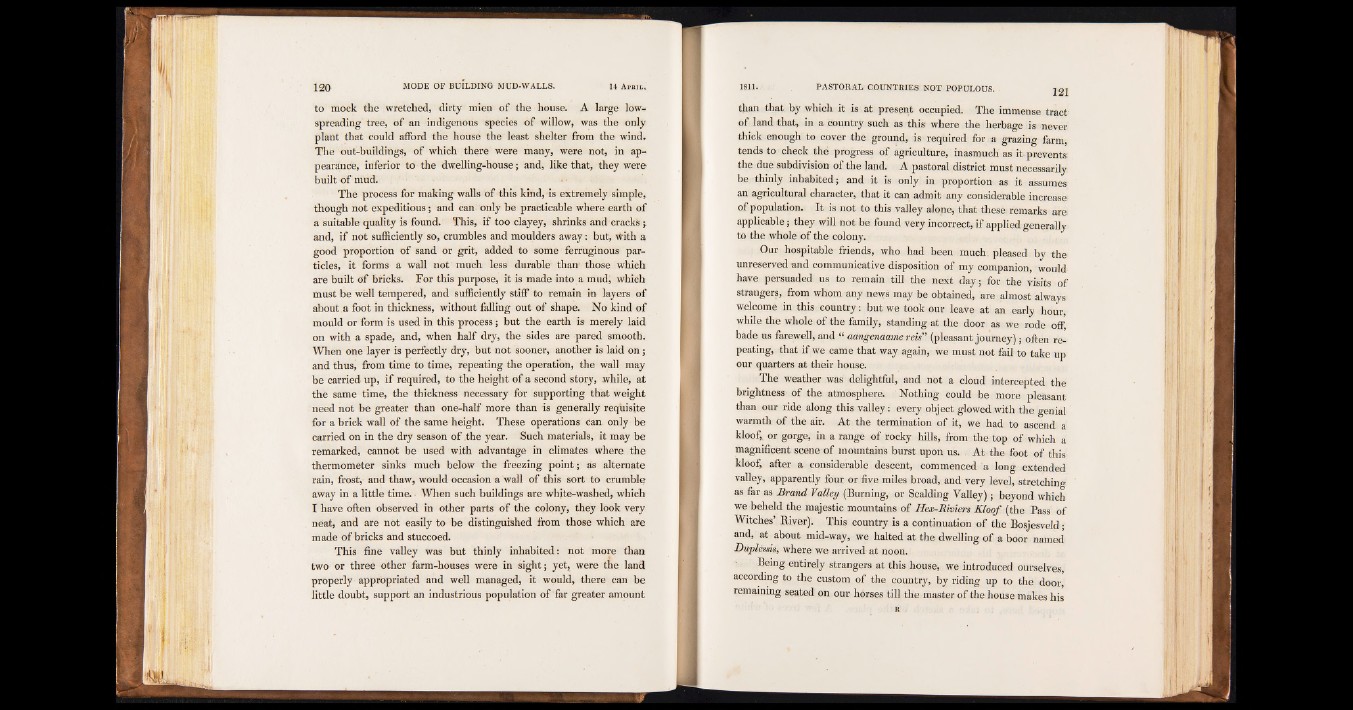
to mock the wretched, dirty mien of the house. A large low-
spreading tree, of an indigenous species of willow, was the only
plant that could afford the house the least shelter from the wind.
The out-buildings, of which there were many, were not, in appearance,
inferior to the dwelling-house; and, like that, they were
built of mud.
The process for making walls of this kind, is extremely simple,
though not expeditious; and can only be practicable where earth of
a suitable quality is found. This, if too clayey, shrinks and cracks j
and, if not sufficiently so, crumbles and moulders away: but, with a
good proportion of sand or grit, added to some ferruginous particles,
it forms a wall not much less durable than' those which
are built of bricks. For this purpose, it is made into a mud, which
must be well tempered, and sufficiently stiff to remain in layers of
about a foot in thickness, without falling out of shape. No kind of
mould or form is used in this process; but the earth is merely laid
on with a spade, and, when half dry, the sides are pared smooth.
When one layer is perfectly dry, but not sooner, another is laid o n ;
and thus, from time to time, repeating the operation, the wall may
be carried up, if required, to the height of a second story, while, at
the same time, the thickness necessary for supporting that weight
need not be greater than one-half more than is generally requisite
for a brick wall of the same height. These operations can only be
carried on in the dry season of the year. Such materials, it may be
remarked, cannot be used with advantage in climates where the
thermometer sinks much below the freezing point; as alternate
rain, frost, and thaw, would occasion a wall of this sort to crumble
away in a little time. • When such buildings are white-washed, which
I have often observed in other parts of the colony, they look very
neat, and are not easily to be distinguished from those which are
made of bricks and stuccoed.
This fine valley was but thinly inhabited: not more than
two or three other farm-houses were in sight; yet, were the land
properly appropriated and well managed, it would, there can be
little doubt, support an industrious population of far greater amount
than that by which it is at present occupied. The immense tract
of land that, in a country such as this where the herbage is never
thick enough to cover the ground, is required for a grazing farm,
tends to check the progress of agriculture, inasmuch as it- prevents
the due subdivision of the land. A pastoral district must necessarily
be thinly inhabited; and it is only in proportion as it assumes
an agricultural character, that it can admit any considerable increase
of population. It is not to this valley alone, that these remarks are
applicable; they will not be found very incorrect, if applied generally
to the whole of the colony.
Our hospitable friends, who had been much pleased by the
unreserved and communicative disposition of my companion, would
have persuaded us to remain till the next day; for the visits of
strangers, from whom any news may be obtained, are almost always
welcome in this country: but we took our leave at an early hour,
while the whole of the family, standing at the door as we rode off,
bade us farewell, and “ aangenaame reis" (pleasant journey); often repeating,
that if we came that way again, we must not fail to take up
our quarters at their house.
The weather was delightful, and not a cloud intercepted the
brightness of the atmosphere. Nothing could be more pleasant
than our ride along this valley: every object glowed with the genial
warmth of the air. At the termination of it, we had to ascend a
kloof,, or gorge, in a range of rocky hills, from the top of which a
magnificent scene of mountains burst upon us. , At the foot of this
kloof, after a considerable descent, commenced a long extended
valley, apparently four or five miles broad, and very level, stretching
as far as Brand Valley (Burning, or Scalding Valley); beyond which
we beheld the majestic mountains of Hex-Riviers Kloof (the Pass of
Witches’ River). This country is a continuation of the Bosjesveld;
and, at about mid-way, we halted at the dwelling of a boor named
Duplessis, where we arrived at noon.
Being entirely strangers at this house, we introduced ourselves,
according to the custom of the country, by riding up to the door,
remaining seated on our horses till the master of the house makes his